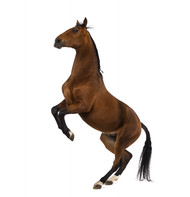Equine Joint Health
Posted by Darren Walton on 6th Sep 2022
If horses or ponies are in work then their joints will undoubtedly be subject to unnatural pressures. From the extended stride in a trot to jumping fences, owners ask a lot of their horses and the joints ability to cope with the extra stresses and strains cannot be taken for granted. As a result, horses in work will often benefit from supplementary support for their joints – which supplement is best for the horse will depend upon their age, workload and overall joint health.
Generally speaking the joints of a horse will be subject to concussive stress – this will vary depending on the work as well as the work surface. This is not to say that this concussive stress is always detrimental – micro-damage in the joint will increase strength as it is repaired naturally. It is for this reason that long and steady roadwork is often recommended for recovery. However, if the cycle between micro-damage and repair become unbalanced then long term damage can result. This can manifest in a number of ways beginning with a thinning of the synovial fluid. This in turn can lead to changes to the surface of the cartilage – the thick jelly like layer which allows the bones to pass smoothly over each other when the joint is articulated. Unchecked these changes have the potential to lead to conditions such as arthritis.
The simplest way to support the joints of your horse is with a dietary supplement. Often supplementing early is more effective as it helps to prevent the damage from occurring in the first place. For animals which are displaying joint mobility problems we would recommend seeking the advice of your veterinary surgeon as to which supplement would best suit your horse. The attending vet may also prescribe pain killers or anti-inflammatory medication to alleviate any unnecessary suffering.
The sheer amount of joint supplements available can make deciding on the best one somewhat of a mine field. However, there are a number of common important ingredients to be aware of to inform your decision.
Glucosamine
Probably the most common ingredient for joint supplements, Glucosamine is a
natural compound found in cartilage. As a building block of the joint tissue it
is important to ensure sufficient supply for repair of the tissue. There are a
number of forms of Glucosamine, generally the consensus is that Glucosamine
Sulphate is preferable due to the increased bioavailability in comparison to
Glucosamine Hydrochloride for example.
MSM
An organic compound rich in sulphur in tests in both humans and animals have
shown reduced inflammation and pain when taken for joint health. Although MSM
is found naturally in plants, the levels tend to be low and it is lost when
they are processed for storing as feed. As a result, particularly over winter
when fresh grazing is limited, supplementary MSM is vital.
Chondroitin & Hyaluronic AcidBuilding blocks of cartilage and joint tissue – supplementation ensures plentiful supply for the body to repair joints naturally.
Omega 3 Fatty Acids
Generally accepted to have multiple benefits including cognitive health, not
only will they support the joint but also brain function allowing increased
focus and keep older horses feeling young. In terms of joint health their role
as a natural anti-inflammatory is the primary reason for inclusion in joint
supplements.
Herbs
There are a number of herbs commonly used to help support joint health in
horses, these can either directly support pain relief and inflammation or are
useful in flushing out toxins from challenged joint tissue. The most commonly
used are Devils Claw, Turmeric and Ginger. These are particularly useful for
use in veteran horses as often these are banned under competition rules. For
example Devils Claw is a prohibited substance by the FEI. If in any doubt we
recommend seeking clarification from your sport’s governing body.

